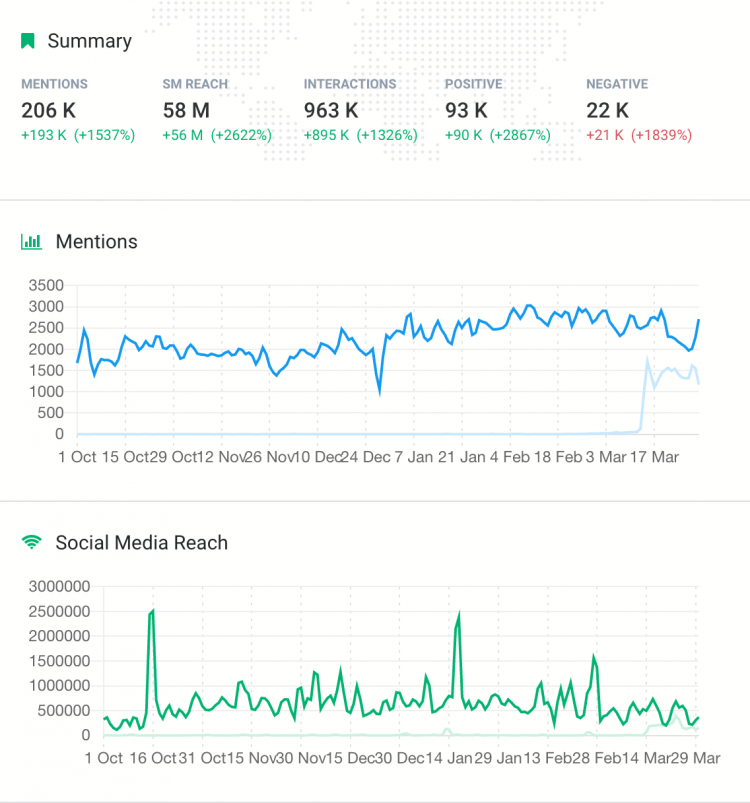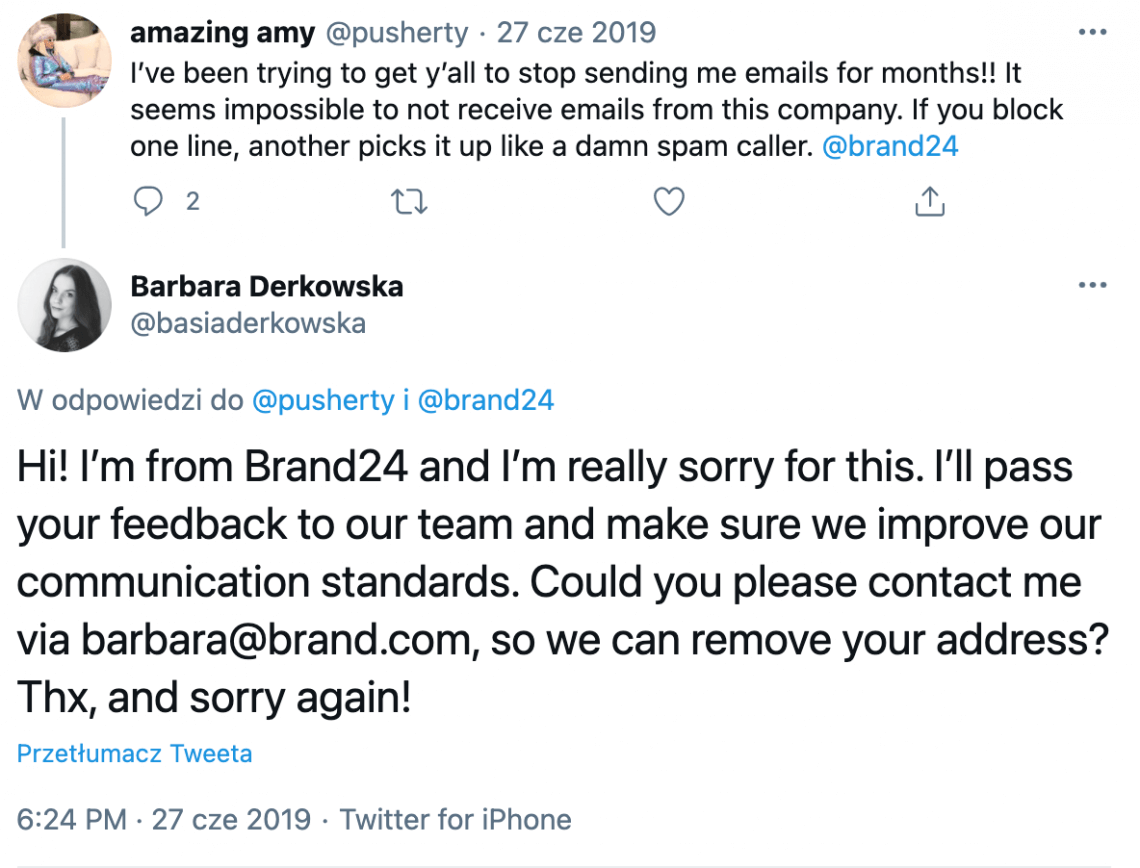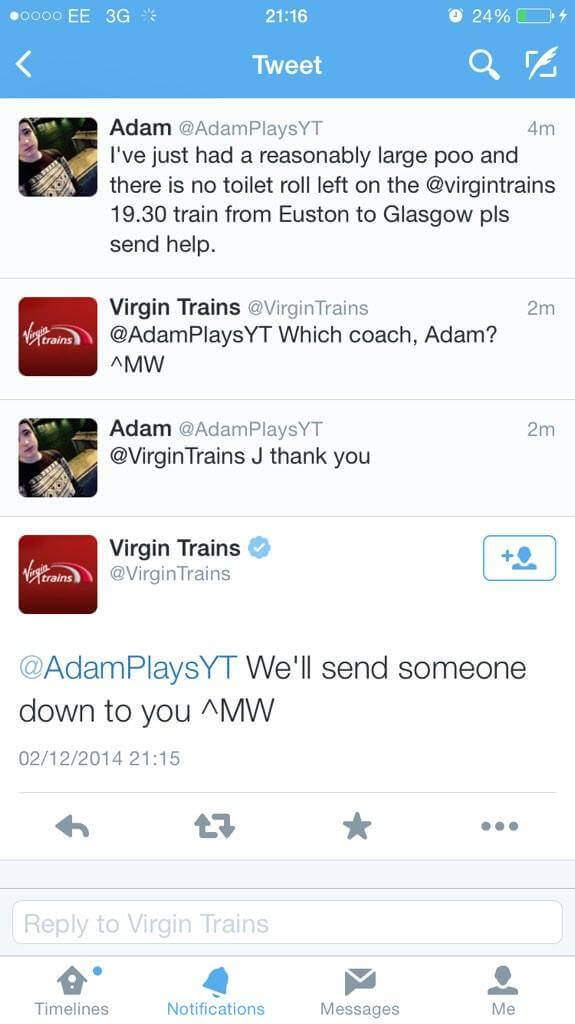Guide to brand reputation management – 2022 update
Brand reputation displays the level of trust in your company and influences your business growth. Introducing brand reputation management strategy will help you stay one step ahead of your competition and can have a positive impact on your bottom line.
Many customers look up reviews before purchase, take a look at company’s CSR activities, and ask their family and friends for recommendations.
Brand reputation management will help you tick all the boxes and increases your market share. How exactly can the process do that?
- What is brand reputation management?
- How to manage brand reputation?
- Is brand reputation management important?
A positive brand reputation means that consumers trust your company, and feel good about purchasing your products or services.
In this text, I’ll show you what are the components of brand reputation and how to build brand loyalty.
Although managing these aspects may sound complicated and time-consuming, with the help of social listening tools it becomes much more manageable.
What is brand reputation management?
Brand reputation shows how a brand is seen by everybody else. A great brand reputation shows the level of trust your target market has in you.
Brand reputation management efforts require constant monitoring of what people say about your company.
When it comes to assessing your brand reputation, your potential customers take several factors into account, for example, friendliness, trustworthiness, quality of product or service, and brand awareness.
Working on your reputation will help you build customer loyalty, reach new audience, and drive growth.
Manage your brand reputation. Start your free trial!
The good news is, the Internet gives business owners means to build and manage their online reputation.
Managing your brand reputation requires regular activities spread over time. You probably won’t see the results right away. In the long run though, managing your brand reputation will bring substantial benefits to your business.
How to manage brand reputation?
Managing brand reputation looks like a one tough cookie. Thankfully, we prepared a short guide to brand reputation management!
You don’t have to follow every guideline we listed. Choose the ones that suit your needs the most and are relatively easy to implement.
Ready? Here we go!
Monitor your organization’s online presence
Brand reputation management starts with… brand monitoring!
To be able to react to online mentions, your PR team have to be aware of everything that is being said about your company, product, or service online.
You can monitor mentions you’re interested in manually — type the name of your company into any search engine and examine the results one by one.
This approach to brand reputation management has one benefit — you don’t need to pay for any additional tools.
The list of disadvantages is a bit longer. For starters, manually searching for online mentions will take a lot of your time. You risk missing some crucial comments. That might spiral and hurt your brand reputation in the long run.
Moreover, many brand monitoring tools will offer additional analytics metrics that will help you measure the results of your marketing campaign, your hashtag reach, or sentiment around your brand.
Track your brand reputation! Create your project!
I encourage you to take a look at Brand24. The tool is one of the most affordable media monitoring tools on the market.
What does it have to offer beside the price?
All features needed for effective brand reputation management, for example:
- real-time media monitoring
- monitoring of social media platforms, such as Facebook, Instagram, Twitter, Twitch, or TikTok
- podcast monitoring
- different forms notifications, including in-app notifications, Slack alerts, and emails
- sentiment analysis
- social media reach calculations
- top public profiles talking about your brand.
How do all these features help brand managers with managing brand reputation?
Let me explain!
To manage your brand reputation, you have to know what people are saying about your brand. The sooner you know, the better.
Online news travel fast, and bad news travels even faster. Your job is to catch the online mentions and react to them accordingly.
Brand24 will inform you about online mentions containing your predefined keyword. The analytics section will help you assess the severity of the situation.
Brand sentiment tells you how people feel about your brand. If you see a sudden spike in online mentions together with prevailing negative sentiment, it’s a sign of troubles in the making.

Social media reach is an indicator of how many people could have seen a social media post. This metric will help you assess the effects of your brand awareness campaigns.

Social media reach will also help you assess the damage caused by a negative review or statement.
Brand24 will also identify top public profiles talking about your brand. Working with brand advocates is one of the best ways to manage your brand reputation. The process can do wonders to your brand and have a positive effect on your bottom line.
Try brand monitoring yourself! Brand24 offers a 14-day free trial (no credit card required).
Monitor customers reviews
According to research provided by Bright Logical, 86% of consumers read reviews for local businesses (including 95% of people aged 18-34).
We live in a time of massive advertising, and it’s impossible to verify if these ads are describing products or services fairly or not. Due to much false advertising, people limited their trust to businesses promoting their products or services.
That’s why review sites are so popular.
Nowadays, people much more trust online reviews written by other customers rather than regular ads. It happens because people are looking for real, honest, and unfiltered reviews and opinions made by real users and based on their experience with the brand.
91% of 18-34-year-old consumers trust online reviews as much as personal recommendations.
That’s is why online reviews are crucial for your brand reputation – they are an excellent way to build a more significant social reach and establish trust, which converts potential customers into paying customers.
Track brand reputation! Start your free trial!
Feedback and business improvement
Another benefit you get from online reviews is feedback about your product. That’s why you should pay attention to what people are saying about you.

Even if review is negative, you should read it carefully and try to draw conclusions. Negative surveys can help your business by showing you the weakest links of your product or service. Thanks to that, you can correct all the mistakes and improve your business according to your customers’ desires!
Monitoring reviews and upgrading your service will lead to growth in sales, will help you determine the priority of features development
What’s also essential – negative opinions may show you in a favorable light! It all depends on how you respond to them. If you admit that you’ve made a mistake, apologize and show that you drew conclusions from the review, people will accept it.
Show your human face, let people know that there is a real person on the other side of the screen. We are all human and making mistakes is a human thing. Your reaction is most important.
Boost customer satisfaction
Monitoring customer conversations should lead to improving customer satisfaction.
Happy customers stay longer with your company and provide a long-term revenue.
Customer loyalty can provide a perpetual motion to your company. Not only will they form a loyal customer base. Satisfied customers will spread the word about your product or service. And there’s nothing like the word-of-mouth marketing.
When it comes to managing your brand reputation and boosting customer satisfaction, time is of the essence. Try to resolve your customers issues as fast as possible.
To do that, you have to be aware of the problem. That’s why monitoring mentions around your brand is so crucial.
Furthermore, you should offer multiple levels of communication. Your clients should be able to choose the channel that suits them best, for example, social media, live chat solution, email, or phone.
Provide excellent customer experience
Customer experience is slowly becoming one of the most important decision-making factors when it comes to purchasing decisions.
How do you distinguish your customer service from other players on the market?
Firstly, think about personalisation of your message. Every customer expect that their needs will be met and they will get exactly what they need.
You can prepare a dedicated path within your marketing automation tool and try to deliver the most suited message possible.
Moreover, you should ask your customers for feedback and implement the solutions. You can send surveys or just monitor the issues your customers report repeatedly.
It’s important to stay in touch with your customers. Regularly sending newsletters will form a bond between your customer and your company, provided you can deliver content that is interesting.
Manage brand reputation! Start your free trial!
If you won’t provide en excellent customer service, your clients will turn to your competitors. Don’t worry, in that case, we still got you covered!
Monitor your competitors efforts
A single product can be described with tons of different ideas and keywords on dozens of networks. Identifying the right places for advertising your product and the most effective ways to do it is one of the most critical aspects of your online presence. Unfortunately, it can be difficult and may cost you a lot if you don’t know how to do research.
Monitor marketing campaigns
That’s why you should monitor your competitors, especially brands which are more successful than yours. With the help of social listening tools, you can monitor the whole brand and specific products by tracking keywords like
- your brand name
- your product name
- your branded hashtag
- your industry name
etc.
These tools will show you which networks are the most effective and accessible, which hashtags are most popular in your industry and how well is your competition performing in social media.
You can also find their weakest links by reading the negative reviews about their products and avoid these mistakes in your company.
Track your competitors’ moves, compare your results with them, and adjust your marketing, sales, and communication to the newest trends.
Stay on top of the industry trends
Companies create the industry, and you need to keep up with the changes. Do you remember Nokia? It was one of the biggest cell phone producers on the planet, selling millions of cells in the first years of the XXI century.
Unfortunately, Nokia overlooked the upward trend of touch screens and almost disappeared from the market in favor of companies like HTC, Samsung, or Apple.
Monitor your competitors and analyze their new products and how they are performing on social media. As you can see, in extreme cases, oversight of a vital trend may eliminate you from the game.
Community engagement
Social media are the easiest way to communicate with your customers, so it’s crucial for you to know how to improve social media engagement. Also, social media platforms like Facebook and Twitter became the first places people go for customer support, product queries, or to say how awesome your brand is.
80% of 18-34-year-olds have written online reviews – compared to just 41% of consumers over 55.
What’s more, people love positive interactions with brands on social media. It makes them feel important as a customer.
Manage brand reputation. Create your first project!
According to Sprout Social research, 30% of customers who are neglected by brands on social media are more likely to switch to a competitor.
Social media posts are, by design, public and easy to comment and share so if you have an engaged community it’s easier for you to go viral if you post something funny (but related to your brand), or you’ll positively shock people with your world-class customer service as Virgin Trains did:

Brand awareness
Simply put, brand awareness is the knowledge that your desired customers have about your brand. Customers should know what you sell and what values you present every time they hear your brand’s name.
So, brand awareness measures a potential customer’s ability not only to recognize a brand image but also to associate it with a particular company’s product or service.
For example, if you hear “Apple,” you will probably think about iPhone or MacBook right away. If you hear “Mercedes” you’ probably immediately think about remarkably comfortable german cars with a distinctive star-shaped logo.
Track brand awareness! Start your free trial!
Why is brand awareness essential for your brand reputation?
Having an original image, values, and an audience that can distinguish a company’s brand from its competitors is crucial in building relations with your customers.
Researches show that people are even willing to pay more for the products or services of brands with which they identify themselves.
When consumers are aware of the products or services a company offers, have a positive association with this company, they are more likely to choose its products instead of a competitor’s.
Having a keen brand awareness is like being accepted by the market. If your brand has strong brand awareness, it means that people trust you, identify with your brand, what is crucial in today’s world.
SEO and content marketing
Content marketing is important for managing brand reputation. I say it not only because I’m a content marketer by trade.
Content marketing is one of the most important elements of managing your brand reputation.
To truly success in content marketing efforts for brand management, you should focus on content that will solve your customers problems. Think about educating your customers, rather than selling right away.
Once your content becomes popular, and you are considered an expert in your field, you will be able to easily expand your brand’s presence.
That’s where SEO becomes important. If you position your website well and it will rank organically for the keywords strategic to your business niche. That will drive organic traffic to your website, further boosting your brand positioning.
Is brand reputation management important?
To sum up, brand reputation management is crucial for growing a business. A positive brand reputation builds loyalty and increases customer confidence in your brand and product, which leads to an increase in sales.
In the multitude of daily duties, it can be easy to forget about the importance of brand reputation management, but if you want your business to grow, you need to keep your finger on the pulse.
Lack of brand reputation management can seriously harm your brand and cause damages, which will take a lot of time, money, and effort to repair.
I also strongly recommend you to read these posts to get to know more about what is brand reputation management, ethical practices, and useful tools:
Do your want to know more about media monitoring and online reputation management? We got you covered! Take a look at our Udemy free course in media monitoring!
![Online reputation management in-and-out: what’s, why’s, and software [2022]](png/10-pieces-of-best-reputation-management-software-640x300.png)



